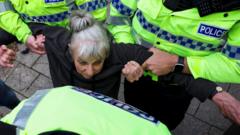What Happened at the Palestine Action Protest Outside the Labour Conference?

Published: 2025-09-28 16:10:17 | Category: technology
Protests erupted outside the Labour Party conference in Liverpool as activists from Palestine Action clashed with police over recent arrests related to their support for the group. This demonstration highlights the ongoing tensions surrounding the UK government's designation of Palestine Action as a proscribed organisation under the Terrorism Act.
Last updated: 25 October 2023 (BST)
Background: What is Palestine Action?
Palestine Action is a direct action group that advocates for Palestinian rights and opposes Israeli state actions. In July 2023, the UK government officially proscribed the group under the Terrorism Act, making any support for its activities a criminal offence. This designation has sparked intense debate surrounding free speech, activism, and the definition of terrorism in the UK.
Key Takeaways
- Protests outside the Labour Party conference in Liverpool led to multiple arrests.
- Palestine Action was designated a proscribed organisation in July 2023.
- Support for the group can result in significant legal consequences, including imprisonment.
- Protesters are advocating for the repeal of the group's proscription.
- The government is facing legal challenges regarding the ban on Palestine Action.
The Events at the Labour Party Conference
On the day of the Labour Party conference, approximately fifty protesters gathered outside the ACC Liverpool, holding placards that read, "I oppose genocide, I support Palestine Action." This demonstration was part of a broader effort by activists to dissent against the government's recent actions and to highlight their concerns regarding Palestinian rights.
Merseyside Police confirmed that they were in the process of making arrests under suspicion of wearing or carrying articles supporting a proscribed organisation. The arrests occurred near the Wheel of Liverpool, a prominent city landmark, and were met with cheers and claps from other protesters.
Legal Context: The Terrorism Act
The designation of Palestine Action as a proscribed organisation under the Terrorism Act has significant implications. It renders any form of support for the group illegal, with penalties reaching up to fourteen years in prison. This has raised questions about the balance between national security and the right to free expression, especially in the context of advocacy for Palestinian rights.
The UK government’s decision to proscribe Palestine Action was justified by some officials, including former home secretary Yvette Cooper, who argued that many supporters may not fully understand the group's nature and objectives. Critics, however, suggest that this stance undermines legitimate protest and dissent against government policies.
Public Reaction and Support
The response from the public has been mixed. Many supporters of Palestine Action claim that their right to protest is being unjustly curtailed. Defend Our Juries, the organisation behind the recent protests, stated that participants were aware of the risks involved, yet chose to demonstrate against what they perceive as an "unjust ban" on Palestine Action. They argue that holding signs in support of the group should not be grounds for arrest.
In contrast, there are those who oppose the group’s activities and the message it promotes. During the demonstration in Liverpool, another group of around two hundred counter-protesters, waving Union Jack and St George's flags, expressed their dissent against the government's digital ID plans, further complicating the protest atmosphere.
Recent Developments and Legal Challenges
Earlier this month, the Home Office received permission to challenge a legal ruling that allowed Palestine Action to appeal against its proscription. This ongoing legal battle illustrates the contentious nature of the debate surrounding the group’s status and the implications for free speech in the UK.
Co-founder Huda Ammori has been vocal in her opposition to the ban, arguing that it infringes upon the right to free speech. The legal arguments against the proscription centre on the idea that peaceful protest should not be criminalised, particularly when it seeks to advocate for human rights.
The Broader Implications of the Proscription
The designation of Palestine Action as a terrorist group has broader implications for civil liberties in the UK. As protests against the ban continue to grow, many activists worry about the potential chilling effect on free speech and the ability to organise politically. The arrests made at the Liverpool protest could discourage individuals from participating in similar demonstrations for fear of legal repercussions.
Furthermore, the discourse around Palestine Action and its proscription raises critical questions about the definitions of terrorism and extremism in the UK. Critics argue that the government's approach may be more about stifling dissent than addressing actual security concerns.
What Happens Next?
The future of Palestine Action and its supporters remains uncertain. As the legal challenges unfold, the implications for similar activist groups could be significant. The UK government will likely face increasing pressure to justify its actions and to clarify its stance on the balance between national security and civil liberties.
This situation serves as a pivotal moment for activists, policymakers, and the public in the UK. The outcomes of these protests and legal challenges could shape the landscape of political activism in the country for years to come.
FAQs
What is Palestine Action?
Palestine Action is a direct action group advocating for Palestinian rights, known for its protests against Israeli state actions. The UK government has classified it as a proscribed organisation under the Terrorism Act.
Why was Palestine Action proscribed?
Palestine Action was proscribed due to concerns about its actions and rhetoric, which the government deemed supportive of terrorism. This designation makes support for the group a criminal offence in the UK.
What are the consequences of supporting Palestine Action?
Supporting Palestine Action can lead to severe legal consequences, including arrest and imprisonment for up to fourteen years under the Terrorism Act.
What is the current legal status of Palestine Action?
The Home Office is currently challenging a ruling that allowed Palestine Action to appeal against its proscription, making the legal status of the group a subject of ongoing debate and scrutiny.
How are protests against Palestine Action's proscription evolving?
Protests against the proscription have been increasing, with activists risking arrest to express their opposition. These events highlight the tension between government policy and the right to protest in the UK.
As the situation develops, the legal and social implications of the proscription and protests will continue to unfold. How will these events shape the future of activism in the UK? #PalestineAction #FreeSpeech #Protests



